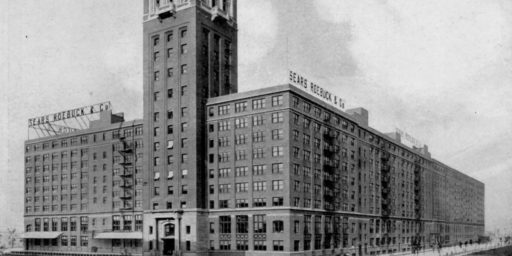Bad Customer Service: Why Do We Put Up With It?
 Via Andrew Sullivan, I see that Daniel Indiviglio argues that “We like bad customer service.”
Via Andrew Sullivan, I see that Daniel Indiviglio argues that “We like bad customer service.”
Actually, though, while he states it, he doesn’t really argue that at all. Rather, he argues that we’re not willing to pay more for good customer service and thus provide no incentive to companies to provide it.
Let’s say you have two options for a flight from New York to Miami. Everything about the two flights is identical except for two things: One airline has poor customer service, but offers you a ticket for $50 cheaper. Do you take the more expensive flight in order to secure the better customer service at a higher price?
Most people, in fact, buy by price. Which partly explains why airlines have had a race to the bottom in customer service and flying is now only slightly more pleasant than taking a Greyhound bus full of winos.
Then again, there’s not much way of knowing when you buy a ticket which of the two carriers will provide a better experience. Few of us fly enough to have an informed basis for forming a judgment and I’m not aware of any really good independent comparison mechanism. For that matter, carriers known for providing a pleasant experience, like JetBlue, do in fact inspire a certain degree of loyalty; but since they also tend to be cheap, it’s hard to disaggregate the effects.
This illustrates an important point: through consumer demand, we ultimately control customer service. If poor customer service was really bothered us, then we could boycott the worst of the perpetrators. I happen to be one of the few people who sticks to a boycott when I’ve been terribly wronged, but I think I’m in the minority. (For example, I haven’t eaten Taco Bell in more than 10 years after swearing it off due to an exceptionally bad experience.) Most people have a very short memory when it comes to bad customer service, especially when low prices entice them return to the company where they experienced annoyance last time.
Most of us, I think, will quickly stop going to restaurants that serve lousy food or treat us rudely. There are plenty of ready substitutes, after all. It’s harder, though, for other things. For example, I refuse to shop at the local Wal-Mart, despite it being conveniently located and typically lower prices, because the shopping experience is so bloody awful. But it took repeated frustration with the store to instill that because the alternatives are a Target store that’s much nicer but farther away or numerous stops at specialty stores.
This is especially problematic with chain stores. If I’m treated poorly by at a sole proprietorship, I can assume that this will be the norm and discontinue shopping there. But one’s experience at a 7-11 really tells you very little about your next trip to that 7-11, let alone how other 7-11s operate.
Regardless, Indiviglio’s larger point is true. For example, hatred of automated customer service systems (For assistance with installing applications on your iPhone, please press 17) is universal. Yet they’re now the norm. They’re obviously cheaper than giving customers what they want — a real, live operator instantly –and customers put up with it.






Well, the mantra is, Competition Will Reduce Price, not Competition Will Reduce Price and Improve Customer Service. I’d argue that the part of the price-reducing mechanism of (a more) unfettered competition is the reducing of costs associated with customer service. And if all your CS choices are more or less equally bad, price might be all you have left upon which to decide.
I think it’s a little more complicated than that, James. Take Dell Computer as an example. Dell didn’t get to the top by being the low-cost supplier, it did so on the basis of a combination of price, products, and service. As it increased market share it pushed other suppliers out.
Once it had established itself at the top of the heap it cut service via offshore outsourcing and, according to my clients who’ve purchased lots of Dell computers over the years, the quality of the products has dwindled, too.
It’s retaining market share by keeping prices low (and preventing new competitors from gaining a foothold) and it’s maintaining margins by cutting everything else.
I will go to pretty great lengths to get on Jet Blue or Virgin. If it’s coast-to-coast I’ll take a connected Blue flight over a direct AA or United. (If all I have is Northwest or USAirways I’ll walk.) I’ll even take a Blue flight over a biz class on a legacy carrier.
It’s the nice seats, legroom, TV and satellite radio, of course, but also the fact that legacy flights tend to be seething tubes of resentment and inchoate rage. (Like Republicans at a town hall meeting. Or anywhere.) While Blue flights are calm and happy. Even Blue’s boarding passes are better.
It’s not just service, it’s ambience. I won’t shop Wal-Mart, I’ll shop Target because Wal-Mart makes me want to hang myself. I’ll gravitate to In-n-Out or Chick-Fil-A — despite the religious crap — because their employees don’t act like sullen thugs and their stores are clean and happy.
Good service absolutely works to secure my business. Bad service drives me away. But I suspect it’s hard to measure the business a store doesn’t get because people got sick of them. I’d point to the late, unlamented Circuit City as a place I avoided for reasons of depressing stores and poor service. And I don’t know that Delta, Northwest and USAirways have a capacity for measuring the degree to which I will avoid them.
JetBlue is seldom an option for me since they lack a heavy DC presence but I do loves me some Virgin Atlantic.
The interesting thing is that my company’s entire business plan is based around the idea that some customers are willing to pay more for better service. I work for a phone and internet provider, and we are in direct competition with the legacy Bell company (Verizon or AT&T, depending on the state).
The baby Bells are required to lease us their local lines for us to resell at a wholesale rate, but we still can’t sell the service to customers cheaper than they can. So our only selling point is that we’re going to give you a hell of a lot better and faster service than Verizon/AT&T will. And the fact that we’re still in business means that it at least works with some segment of the customer base. That type of sales pitch tends to work a lot better for corporate customers than residential, however.
I used to get my DSL through Speakeasy, even though it was the exact same lines as Verizon, and the same technicians. The big difference was that I never had to speak to Verizon.
Dealing with the terrible customer service at Verizon proved to be one of those odious tasks I was willing to pay someone else to do.
@Dave
My understanding re Dell is that its corporate customers raised such a stink about the outsourced tech support, that Dell brought it back into Texas. That, of course, was corporate tech support.
My favorite outsourced tech support story is this. My wife’s boss had a laptop that went on the fritz. She called tech support for him, and the nice young man in India said no problem, he could have someone there at 9AM on July 4….My wife said, let me talk to your supervisor. After explaining what July 4th is for us, she got the number of local company that did the repair work and arranged things. The lady she spoke to stateside told her that stuff like that happened all the time.
Isn’t this the root of the problem, that people want something they don’t want to pay for, or more correctly that they want someone else to pay for since it can’t be free? Now why would so many people come to think that way?
Airlines do no town enough of the process to warrant trying to compete on service. The airlines do not own the parking lots at the airports, the taxis to the airport, or the shuttles to the airport. They do not control the common areas at the airport and basely own the queues in front of their own counters. They do not control security, the waiting areas, the stores and restaurants. They generally do not even control the baggage handling.
So the question is whether $50 dollars worth a little more leg room on the plane or a better food on the airline. Considering that the big airlines use different airlines as feeders, they do not even control all of their flights.